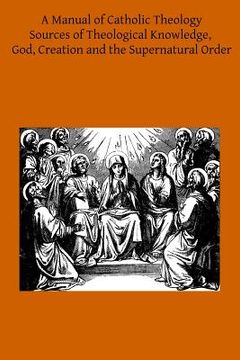Reseña del libro "A Manual of Catholic Theology: Based on Scheeben's Dogmatik (en Inglés)"
This is a two volume set Volume 1: Sources of Theological Knowledge, God, Creation and the Supernatural Order Volume 2: The Fall, Redemption, Grace, The Church, The Sacraments, The Last Things Henry Edward Cardinal Manning writes: Dr. Wilhelm and Fr. Scannell have conferred upon the faithful in England a signal boon in publishing Scheeben's scientific Dogmatik in English, and condensing it for careful and conscientious study. St. Anselm, in his work, "Cur Deus Homo?" says, "As the right order requires that we should first believe the deep things of the Christian faith before we presume to discuss them by reason, so it seems to me to be negligence if, after we are confirmed in the faith, we do not study to understand what we believe." The Dogmatik of Scheeben is a profuse exposition of the deep things of faith in the light of intelligence guided by the illumination of the Church. Although, as Gregory of Valentia teaches, in accordance with the Catholic schools, that Theology is not a science proprie dicta, because it cannot be resolved into first principles that are self-evident, nevertheless it is higher than all sciences, because it can be resolved into the science of God and of the Blessed, known to us by revelation and faith. Theology may for that cause be called wisdom, which is higher than all science, and also it may be called science for many reasons. First, because, if it be not a science as to its principles, it is so as to its form, method, process, development. and transmission; and because, if its principles are not evident, they are in all the higher regions of it infallibly certain; and because many of them are necessary and eternal truths. Revelation, then, contemplated and transmitted in exactness and method, may be called a science and the queen of sciences, the chief of the hierarchy of truth; and it enters and takes the first place in the intellectual system and tradition of the world. It possesses all the qualities and conditions of science so far as its subject-matter admits; namely, certainty as against doubt, definiteness as against vagueness, harmony as against discordance, unity as against incoherence, progress as against dissolution and stagnation. A knowledge and belief of the existence of God has never been extinguished in the reason of mankind. The poly theisms and idolatries which surrounded it were corruptions of a central and dominant truth, which, although obscured, was never lost. And the tradition of this truth was identified with the higher and purer operations of the natural reason, which have been called the intellectual system of the world. The mass of mankind, howsoever debased, were always theists. Atheists were anomalies and exceptions, as the blind among men. The theism of the primaeval revelation formed the intellectual system of the heathen world. The theism of the patriarchal revelation formed the intellectual system of the Hebrew race. The theism revealed in the incarnation of God has formed the intellectual system of the Christian world. "Sapientia redificavit sibi domum." The science or knowledge of God has built for itself a tabernacle in the intellect of mankind, inhabits it, and abides in it The intellectual science of the world finds its perfection in the scientific expression of the theology of faith. But from first to last the reason of man is the disciple, not the critic, of the revelation of God: and the highest science of the human intellect is that which, taking its preamble from the light of nature, begins in faith; and receiving its axioms from faith, expands by the procession of truth from truth. The great value of Scheeben's work is in its scientific method, its terminology, definitions, procedure, and unity. It requires not only reading but study; and study with patient care and conscientious desire to understand. Readers overrun truths which they have not mastered. Students leave nothing behind them until it is understood.

